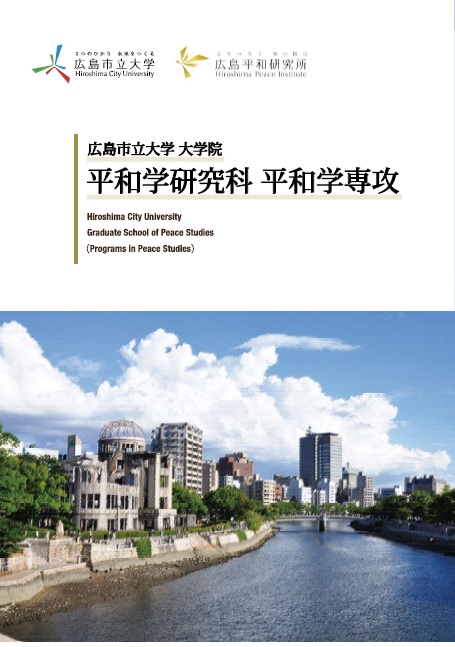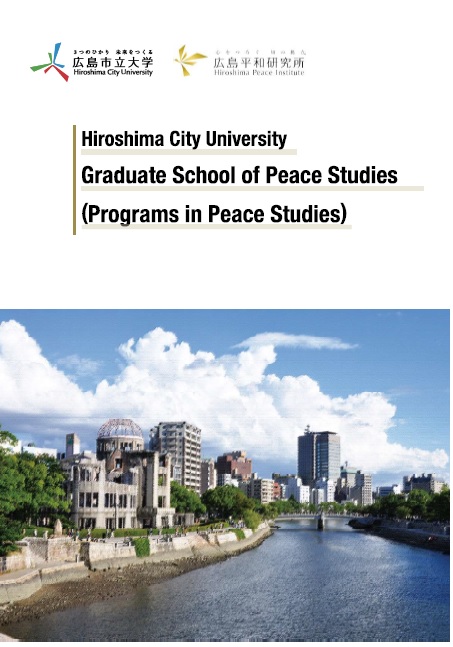平和学研究科パンフレット
平和学研究科 平和学専攻 博士後期課程
2019年4月の平和学研究科修士課程の設置に続き、2021年4月に新たに設置した博士後期課程では、平和学をはじめ国際政治学、国際法学、国際関係論等に関連する専門領域の分析手法を修得し、その上で、現実の諸問題を専門的かつ総合的に分析する能力を有するプロフェッショナルな人材を養成することにより、平和創造および平和維持に貢献することを目的としています。
▶ NEW 2024年10月入学 平和学研究科博士前期課程学生募集要項(外国人留学生特別入試)を公表しました。出願期間:5月13日(月)~5月24日(金) / October 2024 Admission, MA Program, Admission Guidelines for International Students released
▶ 2024年4月入学 平和学研究科博士後期課程学生募集要項(一般入試)を公表しました。出願期間:2023年12月13日(水) ~ 12月20日(水)
▶ 2024年4月入学 平和学研究科博士前期課程学生募集要項(外国人留学生特別入試)を公表しました。出願期間:11月3日(金)~11月16日(木) / April 2024 Admission Guidelines released
▶ 2023年10月入学 平和学研究科博士前期課程学生募集要項(外国人留学生特別入試)を公表しました。出願期間:5月4日(木)~5月17日(水) / October 2023 Admission Guidelines released
▶ 遼寧大学(中華人民共和国)卒業者を対象とする給付型の奨学金制度を創設しました
▶ 韓国国籍である者等を対象とする給付型の奨学金制度を創設しました
▶ 大芝研究科長のインタビュー記事(中国新聞2020/9/21)
博士後期課程の概要
●養成する人材像
①グローバル/リージョナル・ガヴァナンスの構造と人間の安全保障との関連を洞察できる能力を持ち、同時に、人間の安全保障と国際平和の制度構築に向けた有効な平和政策を考案できる研究者
②高度に専門的な知識を持ちつつ平和創造および平和構築に向けた国際公共政策の立案・策定に貢献できる国際公務員、国際NGO・NPOの職員、および公共政策・国際関係の実務に携わる国家公務員・地方公務員
③今日の国際紛争およびグローバル問題など様々な事象を科学的かつ複眼的に分析する手法を修得し、同時に市民社会や国際社会に向けて平和創造の視点から発信する力を有するジャーナリストおよびマスメディア専門家
●取得できる学位:博士(平和学)
●修業年限:3年
●入学定員:4名
カリキュラムの特色
博士後期課程では、博士学位論文の構想作成に必要な学識を身につける特殊研究科目をまず修得します。その上で、博士学位論文の作成に必要な研究指導を段階的に行う研究演習科目(平和学研究演習 Ⅰ~Ⅵ)での指導を通じて、博士学位論文の完成を目指す教育課程を編成しています。
特殊研究科目
各分野において、博士学位論文の構想作成に必要な学識を身に付けます。
| 科目区分 | 授業科目の名称 |
|---|---|
| 特殊研究科目 | グローバル・ガヴァナンス論特殊研究、現代社会と平和特殊研究、現代国際法と平和特殊研究、日本国憲法と平和主義特殊研究、核と歴史特殊研究、グローバル・ヒバクシャ特殊研究、軍縮国際法特殊研究、軍縮と平和特殊研究、安全保障論特殊研究、グローバル・コミュニケーション論特殊研究、平和思想と平和運動特殊研究、東南アジアの紛争と協力特殊研究、韓国・北朝鮮外交と核問題特殊研究、現代中国の政治と外交特殊研究、日本の近現代史特殊研究、国連論特殊研究 |
The Graduate School of Peace Studies(Doctoral Degree Program)
Following the establishment of the Master's program in April 2019, the Doctoral program will be newly established in April 2021. The Graduate School of Peace Studies works towards the realization of world peace by providing a curriculum that trains graduates in: 1)analytical academic methodologies in specialized areas such as Peace Studies, international politics, international law and international relations, and 2)the specialized and wide-ranging skills needed to analyze a diversity of real-world problems.
Outlines
●Career paths graduates will be prepared for:
(1)Researchers with the intellectual ability to identify and analyze the connections between—1)the framework of international relations and basic structure of politics and governance, and 2)human security—capable of developing measures to prevent conflicts and resolve disputes;
(2)International officials, NGO and NPO employees who can contribute to the formulation of international public policy designed to build and maintain peace; and national and regional public servants working on public policies and international relations; and
(3)Journalists and mass-media professionals who can astutely and systematically analyze a diversity of issues including international disputes and global problems, skilled at sharing information with civil society and the international community from a peacebuilding perspective.
●Degree: Ph.D. (Peace Studies)
●Terms of Study: 3 years
●Number of Applicants to be Admitted: 4
Curriculum Features
The Doctoral degree program is composed of the "Advanced Seminar" which enables students to acquire academic knowledge for developing their dissertation concept, and the "Research Seminar" which instructs students in research methodologies for their dissertation.
Advanced Seminars
In each field, students will acquire the academic knowledge necessary to prepare a Doctoral dissertation concept.
| Classification | Course Name |
|---|---|
| Advanced Seminar | Advanced Seminar: Global Governance Advanced Seminar: Contemporary Society and Peace Advanced Seminar: Contemporary International Law and Peace Advanced Seminar: Constitution of Japan and Pacifism Advanced Seminar: Nuclear History Advanced Seminar: Global Hibakusha Advanced Seminar: International Disarmament Law Advanced Seminar: Disarmament and Peace Advanced Seminar: International Security Advanced Seminar: Global Communication Advanced Seminar: Pacifism and Peace Movements Advanced Seminar: Conflict and Cooperation in Southeast Asia Advanced Seminar: Korean Foreign Policies and Nuclear Issues Advanced Seminar: Politics and Foreign Policy in Contemporary China Advanced Seminar: Modern and Contemporary History of Japan Advanced Seminar: United Nations |
Course Completion Requirements
①Students must be enrolled for at least three years, satisfy prescribed conditions, and acquire 14 credits.
②Students must submit a Doctoral dissertation, and pass the dissertation screening as well as final examination.
Support Systems for Adult Learners
The systems below are provided to encourage the enrollment of committed adult learners.
①Tuition Fee Exemptions: There is an admission and tuition fee exemption system provided for people working for national and local governments, news media, and international organization. (Applications will be screened.)
②Long-term Study System: Students who apply to be, and are accepted as “long-term study students” may, once they have paid for three years of courses, extend the course period up to six years.


